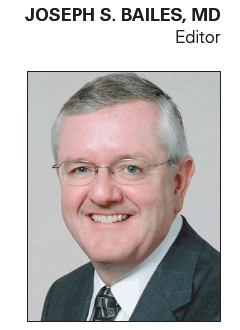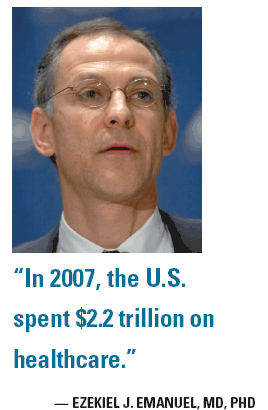Oncology takes blame for rising healthcare cost
Yet oncology drugs account for only 10% of overall U.S. spending on healthcare.
ORLANDO-The central message at the ASCO 2009 health services sessions was loud and clear: An overhaul of the healthcare system is inevitable, and the oncology community should be concerned about the potential impact on provider payment.

“In 2007, the U.S. spent $2.2 trillion on healthcare,” Ezekiel J. Emanuel, MD, PhD, said during an ASCO session on economics. “To put that number in perspective, a billion seconds takes us back to the late 1970s when Richard Nixon resigned, a trillion seconds takes us back to 30,000 BC, which is 15,000 years before the first person stepped foot on North America. And we are spending more than two of those astounding figures each year just on healthcare.”
When it comes to spending, oncology is often singled out, said ASCO session chair Neal J. Meropol, MD. “A few reasons for the focus on cancer are obvious,” he said. “It affects a lot of our population and the diagnostics and treatments are costly, sometimes in an eye-popping way, thus demanding a lot of attention. And sometimes the vastly expensive treatments we prescribe add only modest benefit for our patients.”
He added, however, that although some of the newer cancer drugs have sticker-shock prices as compared with drugs in other therapeutic areas, they only account for about 10% of overall spending. The total of cancer care costs is about 5% of the overall healthcare budget.
Dr. Meropol also noted that high-priced drugs may ultimately prove cost-effective. For example, he said, it costs about $200,000 to extend the life of a patient with metastatic colorectal cancer for one year using expensive targeted agents. “But to put this cost in perspective,” he said, “drugs that are developed for metastatic disease spur further innovation, which leads to therapies in the adjuvant setting, which are far more cost-effective as it relates to survival.”
A simple formula
Dr. Emanuel said that the escalating cost of care will ultimately lead to higher insurance premiums and even lower rates of health coverage, which impacts oncology. “People without health coverage get screened for breast and colorectal cancer about 50% less than those with coverage, with the obvious implications to their health and long-term care,” he said.
He explained that the dramatic rise in healthcare costs is driven by a simple formula:
Price of services × the volume of services = an ever-increasing constant Lowering the price and volume of service is the simplest way to control spending, but that’s not a popular option among providers. “We all know that lowering prices causes an unintended consequence-an increase of services provided by doctors to offset their loss of income,” Dr. Emanuel said.

Dr. Merepol pointed out that the U.S. is often criticized for spending considerably more per capita on healthcare than other industrialized nations without always seeing an improvement in outcomes. In cancer care, spending seems to be justified as it relates to patient outcomes, he said. But the most important question is, what does the cost of cancer care mean for individual patients?
“A patient may value the benefits of a new treatment very differently from his or her healthy oncologist or legislator who might be making decisions about allocations of resources,” he said. “However, due to runaway costs, individual patients are increasingly feeling the burden of higher co-pays, premiums, and the Part D donut hole, which in turn can lead to barriers to care.”
In this economically challenged environment, oncologists need to realize that there are three legs to the decision-making model for patients choosing their therapies. “In the past, patients and their oncologists used to focus exclusively on the benefits and toxicity of treatments. Now it’s clear that monetary issues involved in treatment are a concern that needs to be part of the clinical discussion,” Dr. Merepol said (see “Clinical trial patients cope well with prescription drug fees-for the time being,” June 2009, page 1).
Strengthen accountability
Going forward, providers will have to demonstrate that they are delivering quality, cost-efficient cancer care. A good place to start would be with broader transparency within the oncology community, said Christine Cassel, MD, MACP. “This would help foster a greater sense of accountability. And our accountability should be strengthened without undermining the quality of patient care and the trust of the policy world as we try to redesign a healthcare system based on evidence,” she said.
Dr. Cassel said the oncology community should consider developing integrated delivery systems, multispecialty group practices, and accountable care organizations.
“But most important, our professionalism builds a level of trust within our extended communities of patients, payers, and policy makers. And there are good data showing that when patients fully understand the trade-offs and likelihood of success in their therapy options, they generally choose the less expensive path,” she said.